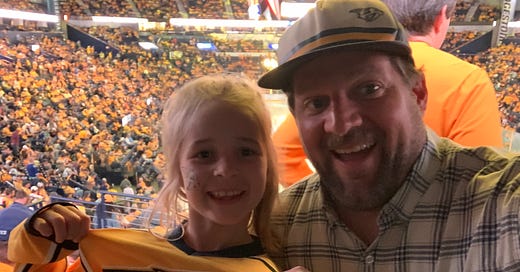I began watching hockey before I was 10. Mostly, the Rangers and almost always with my father.
I’ve loved this game since Mark Messier guaranteed victory over the New Jersey Devils in Game 6 of the Eastern Conference Finals. His hat trick that night forced a seventh game across the river in Madison Square Garden.
New York went on to win Game 7 in double-overtime and eventually broke a 54-year Stanley Cup drought in a seven-game battle with the Vancouver Canucks.
Thanks to Messier and my Dad, hockey was in my blood.
We moved to Nashville, Tenn., in June of 1997 - ironically, the same month that the NHL awarded a franchise to Music City.
Almost 20 years later, I was offered a job hosting a morning show on the Nashville Predators flagship radio station. The franchise had won three playoff series when Braden & Fitz began in September of 2016.
By this point, I had traded in my Blue Shirt for a Gold Sweater. I spent a few years as a Preds season ticket holder when I could afford it. Hell, I even drove back from college for the Predators first home playoff game in 2004.
But this was the first time in my career I was going to officially cover a hockey team. And two extremely magical things happened that year.
First, I became a father for the first time when my oldest daughter was born. Second, the Nashville Predators won three straight playoff series to reach the Stanley Cup Final.
Doing radio at 6 a.m. on three hours of sleep still reeking of Broadway Brewhouse after a Game 6 victory over Anaheim is one of the more surreal moments of my entire life. From what I can remember.
But so was taking that same little girl, now seven years old, to her first Nashville Predators playoff game against, you guessed it, the Vancouver Canucks.
Yes, it was THAT game.
I have no idea how much disappointment she grasped that night walking out of a dejected Bridgestone Arena. But she loves the Preds, loves going to games and I love that she loves it.
So when someone asks me why we are launching a whole-hog Nashville Predators community, I have a really easy answer.
It’s in our blood.






